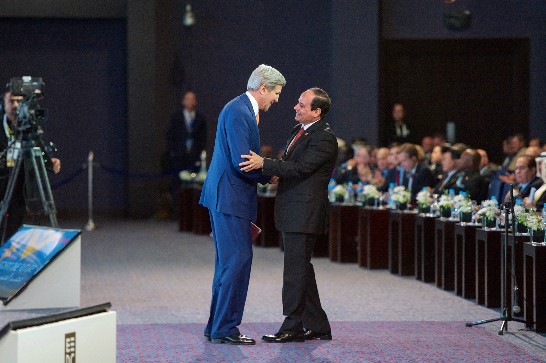
Arming Egypt
Two years after imposing a weapons ban on Egypt, the US lifted the sanctions in March. Reinstating the $1.3 billion in annual military aid to Egypt, the new policy intends to shift away from “cash-flow financing” (buying on credit) by 2018. This flow of aid has been widely debated. In order to understand his change in policy, one must look at what the US’ long-term strategic interests are in the country, and what actions can be taken to best achieve those results.
Egypt’s primary role from a US national security perspective is to set an example of fighting extremism in the Middle East. President Abdel Fattah el-Sisi has been playing an important role in the battle against ISIS, recently calling for an Arab coalition to join the fight. As ISIS continues to recruit along the Egypt/Gaza border, el-Sisi has been working with the US to take steps against terrorism. His government has cracked down on religious extremism, and has moved to secure the Egyptian borders with Libya and Gaza. As one of the US’s strongest and most stable allies in the area, Egypt’s help is invaluable to US national security.
Even given this relative success, there are policies America can implement to increase stability throughout the region going forward. A primary objective is to help foster stable governments in the area that can take on violent Islamic extremists on their own. Militarily funding Egypt supports a government that can be an example of democracy and stability for the countries surrounding it. This is particularly important due to the current instability in Libya and the North Sinai.
In order for Egypt to continue to be able to strengthen security within its borders, and act as an example for the surrounding area, the government must maintain the people’s consent. An important part of that comes from the right for political expression. The US should support Egypt’s attempts to allow non-violent political participation, including the reinstatement of free speech, parliament, and opposition political parties. After two revolutions, it is important that the Egyptian people feel that their government is representative of the will of the people. A functioning democracy should be strived for so that the current government can maintain the people’s trust as legitimate rulers, while supporting policies beneficial to both US and Egyptian security.
The second step the US can take to increase security is to support Egypt in becoming a strong economic partner in the global system. Mubarak’s corrupt economic policies led to mass poverty (40% in 2011) and inequality within the country. If the people remain in severe poverty and unemployment, there will continue to be dissent, violence, and extremism in the area. One of the best things that the United States can do to support the new Egyptian government is to encourage investment and job creation in the area. Egypt is a country that has had little economic growth and opportunity in the past. A secure economy would greatly benefit not only the people but also help to create and maintain regional stability.
For ultimate success, it is crucial that the US’ supports a regionally integrated policy as a mainstay in the fight against ISIS. Supporting Sisi’s Middle East coalition to fight terrorism within their borders is a great example of this policy. With this initiative, Egypt will be financially able to coordinate efforts and develop international strategy for battle religious extremism through their own educational, judicial, and governing systems. Hopefully, reinstating the flow of military aid will be a forward step for Egypt’s new government in reducing the ability of rebel terrorist groups, including ISIS, to expand throughout the Middle East.





